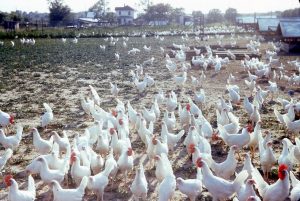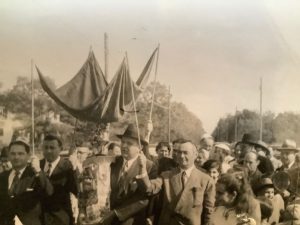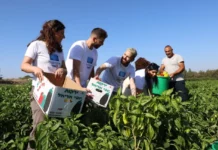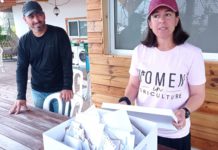
Jewish people are no strangers to wandering through the wilderness. But the wandering hardly stopped after those biblical 40 years in the desert.
In the late 19th century, Jews found their wilderness in the Pine Barrens of southern New Jersey and, over the following decades, against the odds, farmed the land and made it their home. From the 1880s to 1960s, Vineland and the surrounding towns were home to thousands of European Jewish refugees and vibrant Jewish life, from synagogues to kosher butcher shops.
Though now only a scattering of older Jews call the area home, the South Jersey farm communities contain riches of Jewish history.
The stories of the Jewish farming communities in the Garden State have been deemed worth preserving and sharing with the next generation of Jews.
“ALLIANCE,” a documentary by Susan Donnelly telling the story of how Russian Jews settled in the Pine Barrens, premiered at Stockton University in Galloway on April 16. “Speaking Yiddish to Chickens: Holocaust Survivors on South Jersey Poultry Farms,” detailing the next generation of European Jews to grow the farming community, was published by Rutgers University Press last month.
Donnelly, the great-granddaughter of one of the original Russian settlers of the farming community, recognized the importance of the area’s history after attending a reunion celebration.
“I started realizing just how many descendants there are of the colony and just how committed they are to preserving their history, learning about it and how proud they are,” she said. “And it just seemed like all of these people kind of deserved and wanted some kind of acknowledgment of this important piece of history.”
The “ALLIANCE” documentary harkens back to the name of the original Jewish farming community formed outside of Vineland in 1882, made up of 43 original families.
In the late 1800s in Russia, Jews were the victims of rampant antisemitism and pogroms. The Russian czar prohibited Jews from owning land, leading them to flee the country.
The Russian Jewish group Am Olam, committed to maintaining Russian Jewish wellbeing through a connection to the land, joined forces with the French organization Alliance Israelite Universelle to settle Jews in the rural South Jersey Pine Barrens.
True to its name, the land had poor soil for growing crops, and because the refugees were not allowed to own land in their mother country, they had no farming skills. Together with the other immigrant groups in the area — Italians, Germans and Quakers — as well as Lenape and Black farmers, the Russian Jews learned to tend to the land, farming and selling berries, sweet potatoes, asparagus and grapes.
By the 20th century, however, the community began to shrink.
“It was very much kind of a social experiment,” Donnelly said.

“As time went on, as often happens, people separated and started doing things more on their own individually and farming individually, and the sponsors that gave the money to the colony to help them thrive or get through the first five years really had become interested more in the type of capitalist way of farming. … They didn’t really care about the communal or social aspect of it,” she continued.
But the community saw a resurgence in the 1930s when German and Austrian Holocaust refugees settled in the area. Holocaust survivors followed in the years after, thanks to the Displaced Persons Act of 1948.
“There were roughly 500 families, 1,000 survivors,” said Seth Stern, author of “Speaking Yiddish to Chickens” and editor at Bloomberg Industry Group. “The largest concentration anywhere in the U.S. of Holocaust survivor farmers was in South Jersey.”
The farmers of the 1940s kept chickens, sometimes 3,000 chickens for a 10-acre farm, as a way to compensate for the land’s poor farming qualities. Kosher butcher shops abounded, and the area was even home to a Jewish radio show.
“It was a very tight-knit community. There was a lot of common history, shared history,” said Steven Manders, whose Holocaust survivor parents owned a chicken farm in the area before selling it when Manders was a child.
But as the next generation of Jews became educated and left Vineland, and as chicken farming became increasingly industrial, pushing small farms out of the market, South Jersey’s Jewish farming population shrunk once more.
“For the most part,” Stern said, “all of the Jewish farming was gone by
the early ‘70s.”
Today, though with sparse numbers, Jews continue to find and build community in South Jersey. Alliance Community Reboot in Pittsgrove Township, founded by colony member Moses Bayuk’s great-great-grandson William Levin and his wife Malya, help preserve Jewish farming tradition. The Jewish Federation of Cumberland, Gloucester & Salem Counties cares for the area’s Holocaust survivors. Since 2019, Stockton University’s Alliance Heritage Center has worked to preserve the area’s history and curate a digital exhibit.
Thomas Kinsella, the Elizabeth and Samuel Levin Alliance Heritage Center director, noted the preciousness of these stories: “In one way, this is the American dream.”







My grandparents. and others were cattle and dairy farmers in Salem County
in the early 20th century. They lived in the vicinity of Elmer. I have the knife my
maternal grandfather, Jacob Levin,used as a ‘schoket’ butchering for a shop run by
family members at the Jersey shore.